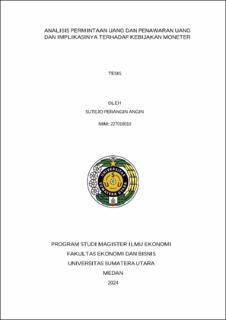| dc.description.abstract | In the economy of a country, the monetary sector plays an important role in maintaining economic stability. The main objectives of the monetary policy implemented by Bank Indonesia are to achieve the stability of the rupiah's value, maintain the stability of the payment system, and support the stability of the financial system to foster economic growth. MD (money demand) is an amount of money asked or wanted by people, MS (money supply) is an amount of money available in companies or JUB (circulating money) in society. The objective of this research is to analyze the influence of PDB (Gross Domestic Product) on MD, the influence of the Bi-Rate on MD, the influence of inflation or MS, the influence of the rate of exchange on MS, and the influence of GWM (minimmum of demand deposit) on MS, and to determine the implications of MD and MS on monetary policy. The period of observation is from 2010 to 2023, using monthly data. The data are analyzed using a simultaneous equation model with Two Stage Least Square (2SLS). The results of the research, based on the equation estimation, show that the variable of PDB has positive and significant influence on MD, the variable of Bl-Rate has a negative and significant influence on MD, the variable BI-Rate has a negative and significant influence on MS, the variable of inflation has a negative and significant influence on MS, the variable of rate of exchange has a positive and significant influence on MS, and the variable of GMW has a positive and significant influence on MS. | en_US |


